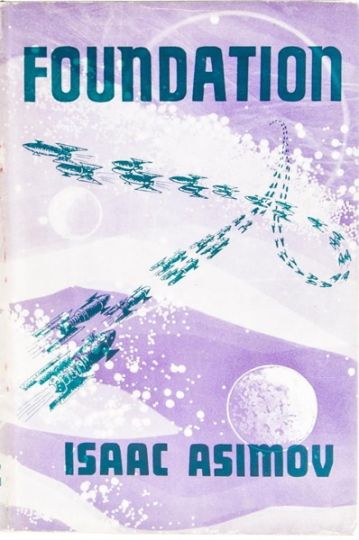One of the most interesting aspects of classic science fiction is its sometimes obsessive bent towards procedural documentation. This first episode of The Foundation has that in spades since it deals primarily with mathematical calculations and encyclopedia entries as a means of world building. I enjoyed all of the different voices and futuristic space age sounds, both of which are probably the only things that got me through this episode. I’m not super familiar with Asimov and I’m sure this whole board-meeting-about-the-state-of-the-universe plot has an ultimate point in this series, but I can’t say that I’m intrigued enough to find out what it is.

Foundation
Isaac Asimov
Isaac Asimov’s Foundation Trilogy1 was in fact three fix-ups of shorter pieces assembled into three volumes. Strongly influenced by Edward Gibbon’s History of the Decline and Fall of the Roman Empire, the series set out to depict the collapse of the Galactic Empire and the attempt by scientists to shorten the ensuing dark age. The series is highly regarded: two sections have won retrospective Hugos and the trilogy as a whole won the Hugo for Best All Time Series in 1966.
The BBC’s radio adaptations are also highly regarded. Surely, combining a respected classic with the BBC’s resources must result in something that will delight and entertain my young readers. Right?
1: I am aware of subsequent volumes.
My first thought: extremely cheesy. The sound effects, sound qualities and voices reminded me of Star Trek: The Original Series, Forbidden Planet, or Captain Proton (Star Trek: Voyager’s sci-fi show spoof). This radio episode seems very dated, and I’m guessing the same could be said of this radio series.
The subject of the empire and imperial matters reminded me very much of Star Wars, and I wondered whether Star Wars was influenced by Foundation.
Part of this is due to the very posh British accents. It reminds me of old-style science-fiction (and indeed, general fictional media) in which everyone inexplicably has RSC accents. Arabian king? British accent. Roman emperor? British accent. Future Galactic empire? British accent.
Personally, I find this kind of story to be rather boring, or at least very easy to lose interest in. This is likely why I lose interest in open-world video games and prefer story-driven ones. Stories about individual lives tend to be the most appealing to me, and I prefer when the politics of the world are more in the background, or provide more surprises to the individual lives of the characters.
I didn’t care about the characters in this story. The main character seemed like the prototypical everyman who knows nothing and must have everything explained to him so that the listener understands what is going on.
Everyone else seemed like a robotic, stereotypical no-one who was either a politician, a scientist or a military-man.
Verdict: Boring to me. Maybe not to others? Time to go have a nap.
—Mel
I was really not looking forward to another Asimov story, considering how much I disliked the last one. I am familiar with the existence of the Foundation books, and I think I might have tried to read one in high school before giving up and moving on to more interesting things.
The assumptions that this story is built on constantly break my suspension of disbelief. I don’t care how advanced their computers are, or how detailed their calculations are, I just am not convinced that they can pin down exact events and the lives of specific individuals in the accuracy they claimed and for centuries at a time, and without that the entire story falls apart.
I also have a very difficult time with the idea that empire is apparently the best and only stable form of government, and that anything else will lead to centuries of suffering until there is a new empire. Considering the decidedly terrible history of empires on Earth, the politics of this story really don’t work for me.
I had a lot of trouble keeping track of the characters after the time jump. It probably would have been easier if I’d been reading instead of listening, but I kept on getting all the random men talking at each other mixed up. I know that the story acknowledged that women exist, but based on the characters it would have been easy to assume that they didn’t.
I hated how this story was adapted for radio. The narration with the echo and the random “music” breaks just detracted from the story and made parts of it difficult to understand. I think it would have been much better without them.
Despite my general exasperation with the entire story, it was more interesting than I expected it to be. But not enough for me to want to listen to the rest of it.
